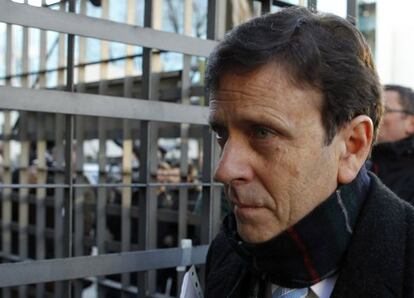Doping trial outcome ends on a low
Spanish organization may appeal lenient rulings in Operation Puerto case

The lenient sentence handed out to the doctor at the heart of Spain’s Operation Puerto doping case has dismayed sporting bodies and individuals across the globe, prompting the Spanish authorities to consider launching an appeal.
Dr Eufemiano Fuentes was given a suspended one-year jail sentence and barred from offering his services as a sports doctor for four years, while sports trainer José Ignacio Labarta was given a four-month term, which will also be suspended, and barred for a similar length of time. The two were charged with public health counts as Spain did not have anti-doping legislation in place at the time the offenses were committed. Anti-doping laws were put in place in November 2006, after the case came to light.
Judge Julia Patricia Santamaría absolved the three other defendants in the case — Fuentes’ sister Yolanda, a former doctor for the Comunidad Valenciana cycling team, and the former cycling team directors Manuel Saiz of Liberty and Vicente Belda of Kelme — after ruling the prosecution had not proven their involvement in a doping ring that implicated a number of top cyclists, including Italy’s Ivan Basso and Germany’s Jörg Jaksche. Both Basso and Jakscheo testified in the trial and confessed to using Fuentes’ blood transfusion services.
The most worrying aspect about the sentence is that the judge ordered around 200 bags of frozen blood seized by the Civil Guard during raids on premises used by Fuentes in Madrid, Zaragoza and El Escorial in 2006 to be destroyed once all appeals had run their course. The decision prevents identifying other athletes involved in the ring, which is believed to extend beyond cycling.
Fuentes had worked with other athletes, including soccer and tennis players, runners and boxers. A doping cloud hangs over Spanish distance runner Marta Domínguez, who is also a senator for the ruling Popular Party.
The judge ruled that to hand over the evidence gathered in a criminal case to authorities to pursue administrative action against those accused violated the basic rights of the individual.
The Italian Olympic Committee managed to persuade another judge involved in the case to hand over a sample of blood allegedly extracted from Spanish cyclist Alejandro Valverde to impose a ban on him for doping.
Ana Muñoz Merino, the head of Spain’s National Anti-Doping Organization (AEA), said the outcome of the trial was far from fully satisfying, and indicated that the AEA might appeal aspects of the judge’s ruling that the organization did not agree with. “As far as we are concerned Operation Puerto is not over,” Merino said. “There are different interpretative criteria in the sentence, which we do not share.” Merino said she would leave the matter in the hands of the legal services of the AEA and the Higher Sports Council (CDS).
The World Anti-Doping Agency (WADA) also expressed disappointment at the outcome of the trial, particularly the decision to destroy the bags of blood seized in the raids. “Wada is currently reviewing the decision and any possible appeal or action with its Spanish legal advisers and the Spanish National Anti-Doping Organization,” Wada said in a statement.
Dick Pound, the former head of Wada, said: “It’s embarrassing for Spain. Everybody knows we will be able to uncover quite a bit more doping if the [blood samples] are made available.”
British tennis player Andy Murray, ranked third in the world, also expressed his disgust at the court ruling. “Case is beyond a joke,” tweeted Murray. “Why would court order blood bags to be destroyed? #coverup.”
During the trial Jaksche and Basso were quick to point the finger at the people behind the sport as those who encourage doping. “The same people who push us into doping later point the finger so they can appear clean and look good in front of everybody,” said Jaksche during his testimony.
Tu suscripción se está usando en otro dispositivo
¿Quieres añadir otro usuario a tu suscripción?
Si continúas leyendo en este dispositivo, no se podrá leer en el otro.
FlechaTu suscripción se está usando en otro dispositivo y solo puedes acceder a EL PAÍS desde un dispositivo a la vez.
Si quieres compartir tu cuenta, cambia tu suscripción a la modalidad Premium, así podrás añadir otro usuario. Cada uno accederá con su propia cuenta de email, lo que os permitirá personalizar vuestra experiencia en EL PAÍS.
¿Tienes una suscripción de empresa? Accede aquí para contratar más cuentas.
En el caso de no saber quién está usando tu cuenta, te recomendamos cambiar tu contraseña aquí.
Si decides continuar compartiendo tu cuenta, este mensaje se mostrará en tu dispositivo y en el de la otra persona que está usando tu cuenta de forma indefinida, afectando a tu experiencia de lectura. Puedes consultar aquí los términos y condiciones de la suscripción digital.








































